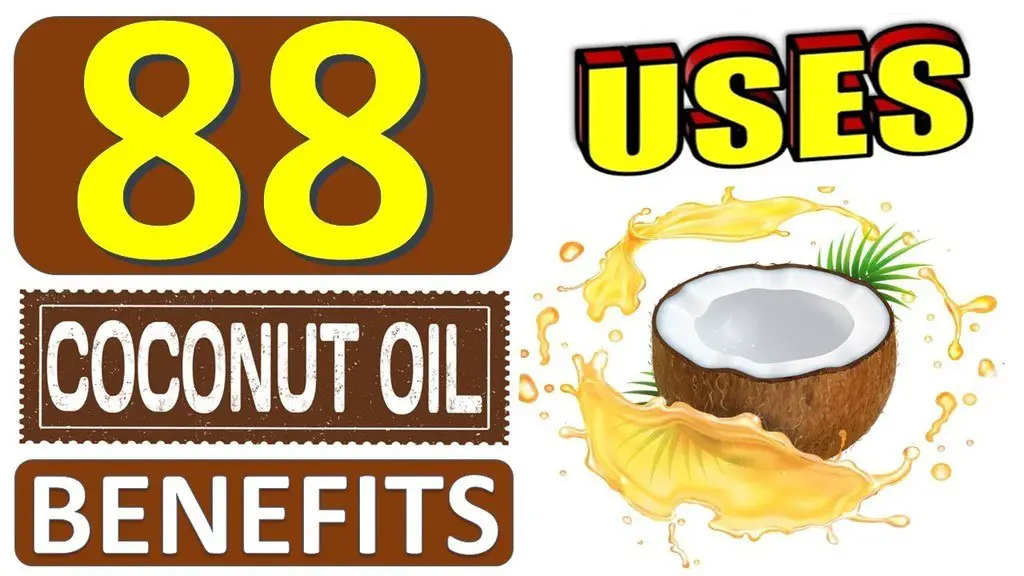Coconut oil has a wide array of health benefits, hair and skin uses, and purposes around the home. If you’ve been keeping track of the latest food fads and trends, you’ve probably noticed the rapid widespread popularity of coconut oil.
In this video, we’re delving into the uses of benefits of coconut oil like never before – so be prepared for an exhaustive list of everything you can do with this understated oil.
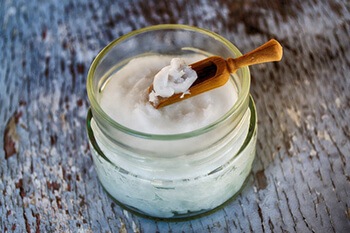
Types of coconut oil
Before jumping into our list, we’ll quickly cover the different types of coconut oil you might see available – and which is best to use.
Unrefined Organic Coconut Oil
Unrefined coconut oil offers most of the benefits listed in this video. It’s extracted from fresh coconut using a wet-milled fermentation process that protects the beneficial properties of the coconut. This type of coconut oil has been found to have the highest antioxidant levels.
“Extra Virgin” Coconut Oil
Extra virgin coconut oil is produced by cold-pressing the oil and doesn’t preserve the antioxidants as well.
Refined Coconut Oils
Refined coconut oil is often tasteless and has no coconut smell. It’s usually heated, bleached, and deodorized. Healthy options are available but many refined coconut oils don’t have the benefits of unrefined.
Fractionated Oil or MCT Oil
Fractionated oil or MCT coconut oil is a liquid oil that doesn’t get solid below 76 degrees like unrefined oil does. It doesn’t contain all of the beneficial properties of unrefined coconut oil but it’s higher in brain-boosting fats.
What Type to Use?
For external uses, expeller-pressed, fractionated, or other types of refined coconut oil will work, but for internal use, unrefined organic oil is best.
Ready to learn some of the best benefits and uses of coconut oil? Let’s get started!
Uses for Coconut Oil in Cooking and Recipes
1. As a cooking oil

Coconut oil is a great cooking oil and is most unique for its high content of saturated fat lauric acid, which makes up around 40 percent of its total fat content and gives it a high smoke point. This makes coconut oil particularly suitable for high-heat cooking like frying.
It is also great for baking, or as a dairy-free replacement to butter.
2. Added to smoothies

You wouldn’t normally think to add coconut oil to your morning smoothie, but it’s a great complementary flavour, and will help to give you the energy that lasts throughout the day. You can combine coconut oil with almond milk or coconut water, banana, pineapple, strawberries, vanilla, oranges, and even kale and cucumber for a tasty, healthy-fat beverage.
3. As a homemade coffee creamer

Coconut oil works particularly well as a coffee creamer and serves as a better alternative to shop-bought creamers that most likely contain a whole host of unnecessary ingredients, including palm oil. Simply mix coconut oil with raw honey, cinnamon powder, and pure vanilla extract to add a delicious creamy kick to your hot drink.
4. Added to homemade mayo
Commercial mayonnaise contains high PUFA vegetable oils, short for polyunsaturated fats are a type of fatty acid. The primary issue with PUFAs is that they are highly unstable and can cause oxidation, which leads to free radicals, the nasties responsible for skin ageing and cancer.
Coconut oil is a much healthier oil alternative to add to your homemade mayonnaise, and it tastes better, too.
5. To season cast iron skillets

When you’re cooking with a cast iron skillet, it takes seconds to add a little extra flavour to your food by seasoning with a cast iron skillet. Simply pour about 1 teaspoon of warmed coconut oil into the skillet.
Then, using a clean, dry cloth or paper towel, rub the oil into the surface of the skillet, making sure to coat the bottom and sides thoroughly.
6. To boost metabolism
Coconut oil has been shown to boost metabolism and even improve athletic performance thanks to its high lauric acid and MCFA content. Studies suggest that the way MCFAs, or medium-chain fatty acids, are digested by our stomach, helps boost metabolism and increase energy.
Lauric acid is rapidly metabolized and is and is an important energy source for the brain, heart, and muscles.
7. For healthy snacking
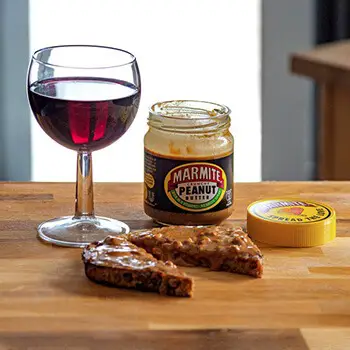
You can use coconut oil in a variety of no-bake healthy snack recipes and is often combined with the likes of organic peanut butter and raw honey to produce an all-natural nutritious pick-me-up. Take a look at raw coconut oil fudge, snack balls, chocolate bark, and granola bars, all of which are much healthier than the majority of snacks you can buy from the supermarket.
8. As an energy-boosting brain power ingredient
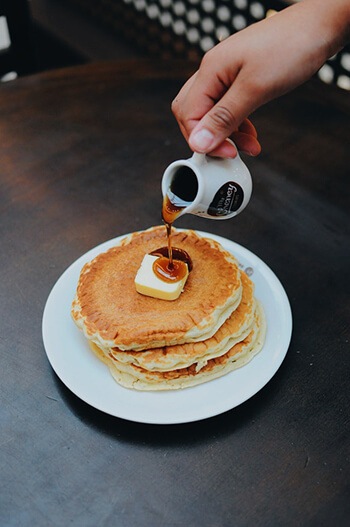
Coconut oil is one of the best ingredients to add to your breakfast, as, like many morning supplements, it has been found to boost energy and brainpower. The MCTs in coconut oil break down into ketones, which can be used by brain cells for fuel.
The idea is that supplying the brain with some extra fuel might make it run better. The easiest way to add coconut oil to your breakfast is to sauté your hot foods in the oil.
You could also add coconut oil to your coffee, put it in a smoothie, bake it into your breakfast bars, or use it for making pancakes.
9.Mixed with chia seeds
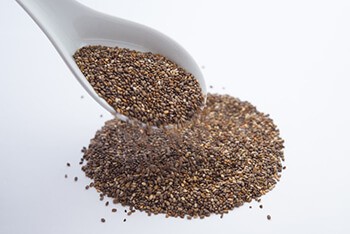
A great energy-boosting recipe idea is to mix a tablespoon of coconut oil. The two ingredients together don’t only boost energy; they also improve digestion, stabilize blood sugar, help brain function, and promote heart health.
10. Used as a replacement for vegetable oils

In almost any recipe or in cooking, you can substitute coconut oil for vegetable oils. Cooking with unsaturated fats, i.e. those that are found in vegetable oil, creates free radicals, which we already know aren’t great for our body.
Coconut oil, on the other hand, is saturated fat and doesn’t become damaged during cooking. This makes it a much healthier alternative for high-heat cooking.
Benefits of Coconut Oil
11. Increases calcium and magnesium absorption
Coconut oil has been shown to increase the absorption of calcium and magnesium. These two minerals are essential for strong bones, and studies have even found that coconut oil may reduce the risk of osteoporosis, a health condition that causes weakened and fragile bones.
12. Good cholesterol source

Virgin coconut oil is full of high-density lipoprotein, or HDL, cholesterol. There are two kinds of cholesterol: HDL cholesterol, which is the good cholesterol that enhances heart health and reduces the risk of heart disease, and LDL, or low-density lipoprotein, cholesterol, which is the bad cholesterol that does the very opposite.
Coconut oil has been found in studies to raise the levels of HDL in the body while lowering LDL.
13. Can help remineralize teeth

Coconut oil attacks the harmful bacteria in your mouth. It can reduce plaque buildup, prevent tooth decay, and fight gum disease. For these reasons, oil pulling or brushing your teeth with coconut oil can significantly improve oral and dental health.
14. Antibacterial and antifungal
Coconut oil has antibacterial and antifungal properties that promote your immune system without the harmful effects of chemical-based antibacterial products. The main antibacterial agent in coconut oil is lauric acid, an antibacterial, and simply incorporating coconut oil into your diet or skincare routine will boost your body’s ability to fight off and prevent bacteria or fungus-based illnesses and infections.
15. Helps speed weight loss

When consumed daily, coconut oil can help you to reach your weight loss goal faster. The MCT content in the oil boosts metabolism and helps you to burn calories faster, and research has found that the oil is effective in decreasing belly fat.
16. Improves sleep

Coconut oil contains high amounts of dodecanoic acid, a type of lauric acid, which has been linked with more restful sleep as opposed to fats like butter, which were linked with impaired sleep. You’ll need to take it on a daily basis to see a difference.
17. Supports a healthy thyroid function
Unlike soy oil and other vegetable oils, coconut oil doesn’t interfere with thyroid function. It has anti-inflammatory properties that can help reduce inflammation that may lead to hypothyroidism and hyperthyroidism.
18. Reduces diabetes risk

One study found that a diet rich with medium-chain fatty acids, like coconut oil, could help prevent obesity and fight insulin resistance — both of which lead to type 2 diabetes. A more recent study showed that coconut oil could reduce blood glucose levels.
This evidence suggests that regularly consuming coconut oil may help to reduce the risk of diabetes.
19. For faster skin healing
Coconut oil has packed full of beneficial fats, which are linked to some potential benefits for the skin, including reducing inflammation, keeping skin moisturized, and helping heal skin after injury or infection.
20. Gets rid of cellulite

When used consistently on the skin, coconut oil can be effective in getting rid of cellulite. It has been shown to play a role in hydrating and smoothing skin, which could help mask the dimples that are characteristic of cellulite.
Studies have found that it can boost collagen production in the skin. Collagen has a firming, tightening effect on skin tissue, which will help to reduce the appearance of cellulite.
21. May help with depression and anxiety

Again thanks to its beneficial fats, coconut oil has incredible anti-stress properties and is rich in antioxidants. In fact, a study found that when treated with virgin coconut oil, mice exhibited higher levels of brain antioxidants.
They also found that cholesterol, triglyceride, and stress levels decreased.
22. Boosts hormone production
The more balanced your hormone levels, the higher you function — physically, mentally, and emotionally. The fatty acids in coconut oil actually help the hormones get to where they want and need to go in the body, and so support the creation, processing, and elimination of oestrogen and progesterone, leading to hormonal balance.
23. Can relieve the pain of haemorrhoids
Treating haemorrhoids often includes helping to control inflammation, discomfort, and itching. This is where coconut oil comes in.
With anti-inflammatory and analgesic properties, coconut oil has a lot of health benefits when applied topically to help treat haemorrhoids, and can soothe pain and speed up the healing process.
24. Boosts circulation
Blood circulation affects everything from your mental functioning and energy level to your internal body temperature. Once released into the blood, coconut oil’s medium-chain fatty acids bind with “bad” cholesterol and help to safely remove it from the bloodstream, while simultaneously boosting the levels of good cholesterol.
This makes circulation more efficient, which is particularly useful for people who always feel cold.
25. Has pregnancy benefits

When taken during pregnancy, coconut oil helps relieve morning sickness, heartburn, and constipation. For mums who are planning to breastfeed, coconut oil is high in lauric acid, which is supposed to stimulate milk production during pregnancy and after birth.
26. May reduce Alzheimer’s risk
In Alzheimer's disease, it's believed that brain cells find it difficult to metabolize glucose. But the ketones that are produced in our bodies when we digest coconut oil may provide an alternative fuel source to keep the brain nourished, which helps the brain to stay healthy and may even reduce the risk of conditions like Alzheimer’s.
Coconut Oil Beauty Uses
27. As an anti-aging facial cream

High-quality coconut oil is a fantastic all-natural anti-aging moisturizer when applied topically. When it absorbs into your skin and connective tissues, coconut oil helps to reduce the appearance of fine lines and wrinkles by helping to keep your connective tissues strong and supple.
28. On the skin as a basic lotion
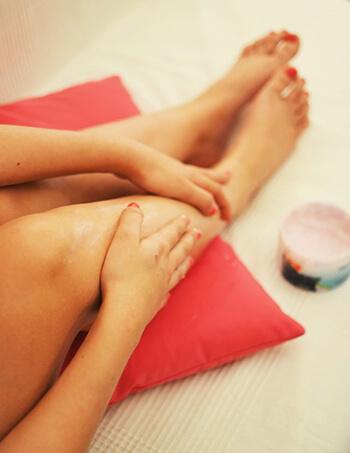
Coconut oil is often sold commercially as a skin lotion, and this is because it’s praised for being a great, hydrating moisturizer thanks to its fatty-acid content. Simply apply to your skin in the evening and let the oil’s beneficial compounds get to work.
29. Combined with shea butter
If you’d rather make your own beauty products, you can whip coconut oil with shea butter to create a body lotion. It’s great to pair shea butter with coconut oil for its impressive moisturizing effect on your skin.
Since both natural products can help with making skin tone more even and lighter, their combination will make this effect more powerful, yet still safe for your skin.
30. For athlete’s foot

Athlete’s foot is a common fungal infection that’s triggered by sweaty feet. Coconut oil may help soothe the infection and flaking skin, as it’s a natural antifungal.
Just apply to clean, dry feet for milk athlete’s foot. For nagging athlete’s foot that won’t go away, first apply athlete’s foot treatment, then top it with a layer of organic coconut oil and cover with cotton socks. This works wonders for cracked heels, too.
31. As a facial moisturizer

Just as you can use it on your body, you can use coconut oil on your face to moisturize your skin. It's particularly effective as a primer to soften the skin before applying makeup. It'll give you a glowy, dewy look after you apply your foundation.
32. As a breath freshener

Coconut oil has antifungal and antibacterial properties. Gargling for 20 minutes with a spoonful of the oil can help clear up any lingering germs in the mouth, leading to fresher breath.
As an added bonus, coconut oil will also give you whiter teeth and healthier gums.
33. In homemade deodorant
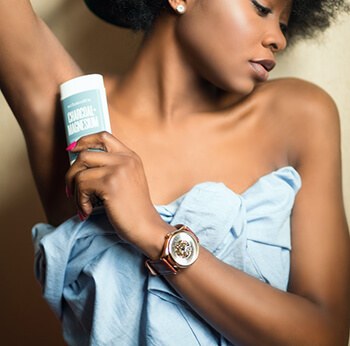
Coconut oil is a wonderful product to use as a base for deodorant because it kills odour-causing fungi, yeast, and bacteria, thanks to its natural antibacterial properties. You can combine it with baking soda and other ingredients for an all-natural deodorant.
34. As an eye makeup remover

Coconut oil breaks up water-resistant substances used in eye shadow and mascara, releasing them from the skin and lashes. Simply liquify the coconut oil in your hands when it's in its natural solid state, and gently rub it onto dry skin, paying special attention to heavy eye makeup.
Once your makeup has been sufficiently melted away, rinse your face with warm water and pat dry.
35. Lightens age spots
Coconut oil provides several benefits that help to eliminate deposits of melanin, which leads to age spots. The oil contains a number of fatty acids, including lauric acid, as well as anti-inflammatory, anti-microbial, and antioxidant compounds.
These substances fight invading pathogens and free radicals that speed up the aging process, as well as encouraging cell turnover, helping you shed your old skin at a faster rate.
36. As a massage oil

Fractionated coconut oil is a light, non-greasy, liquid oil and good massage oil, and can be combined with a couple of drops of your favourite essential oil for the most enjoyable massage experience. As an added bonus, it washes out of sheets and tends not to stain sheets as many massage oils do.
37. Mixed with equal parts sugar for a smoothing body scrub
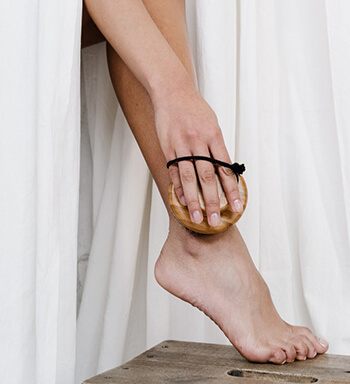
If you don’t know already, body scrubs gently exfoliate the skin removing all your dead skin cells, and coconut oil is the perfect product to integrate into your beauty routine thanks to its moisturizing properties. Simply combine sugar and coconut oil to produce a sweet-smelling, effective body scrub that you can use in the shower on a daily basis.
38. For highlighting cheeks
Nothing perks up a tired face like a little highlighter. Simply sweep a small amount of organic coconut oil on top of makeup and leave it alone.
It looks like your skin but glowier, which is why many natural makeup brands use it as a base ingredient in their formulas.
39. As a natural lip balm

Our lips are particularly sensitive to moisture loss because the skin is thin, and they’re exposed to the elements more so than other parts of the skin. Coconut oil has moisturizing effects and is an emollient, which means it can promote and trap moisture in the skin.
It also has pain-relieving properties that make it useful in treating dry, chapped, and painful lips.
40. As a tinted lip gloss

Take your coconut oil lip balm to the next level by turning it into tinted gloss. It's as simple as you might imagine: just mix up coconut oil with bits of old lipstick, or even add a tiny bit of beetroot juice for a completely natural pink tint.
41. As a natural shave cream

If you’re all out of your usual shave cream, simply slather coconut oil over your legs in the shower and shave per usual. The coconut oil acts as a protective lather between the blade and the skin, preventing irritation and razor burn. It not only acts as a shaving cream but an intense moisturizer as well.
42. As a natural body oil
Why purchase a separate body oil when you can keep coconut oil near the bath? Just slather it on wet skin after the shower, then pat dry. You'll smell like a beach vacation all day, and your skin will stay nice and hydrated.
43. As a night cream

Another one of the most effective coconut oil beauty uses is a night cream. Apply coconut oil to your face at night, then leave it on during sleep for maximum moisturizing benefits.
The antioxidants in coconut oil are great for smoothing fine lines and wrinkles while you sleep, giving it time to really soak in.
44. For eyelash growth

Thanks to the many fatty acids found in coconut oil, it makes an excellent base for creating a DIY eyelash growth serum. Coconut oil can help to stimulate growth and lead to longer lashes.
Combine a tablespoon of coconut oil with one drop of lemon essential oil and one drop of lavender oil, then apply the mixture to your lash line each night with a Q-tip and dab away any excess moisture with a tissue. Your eyelashes will look thicker and longer in no time.
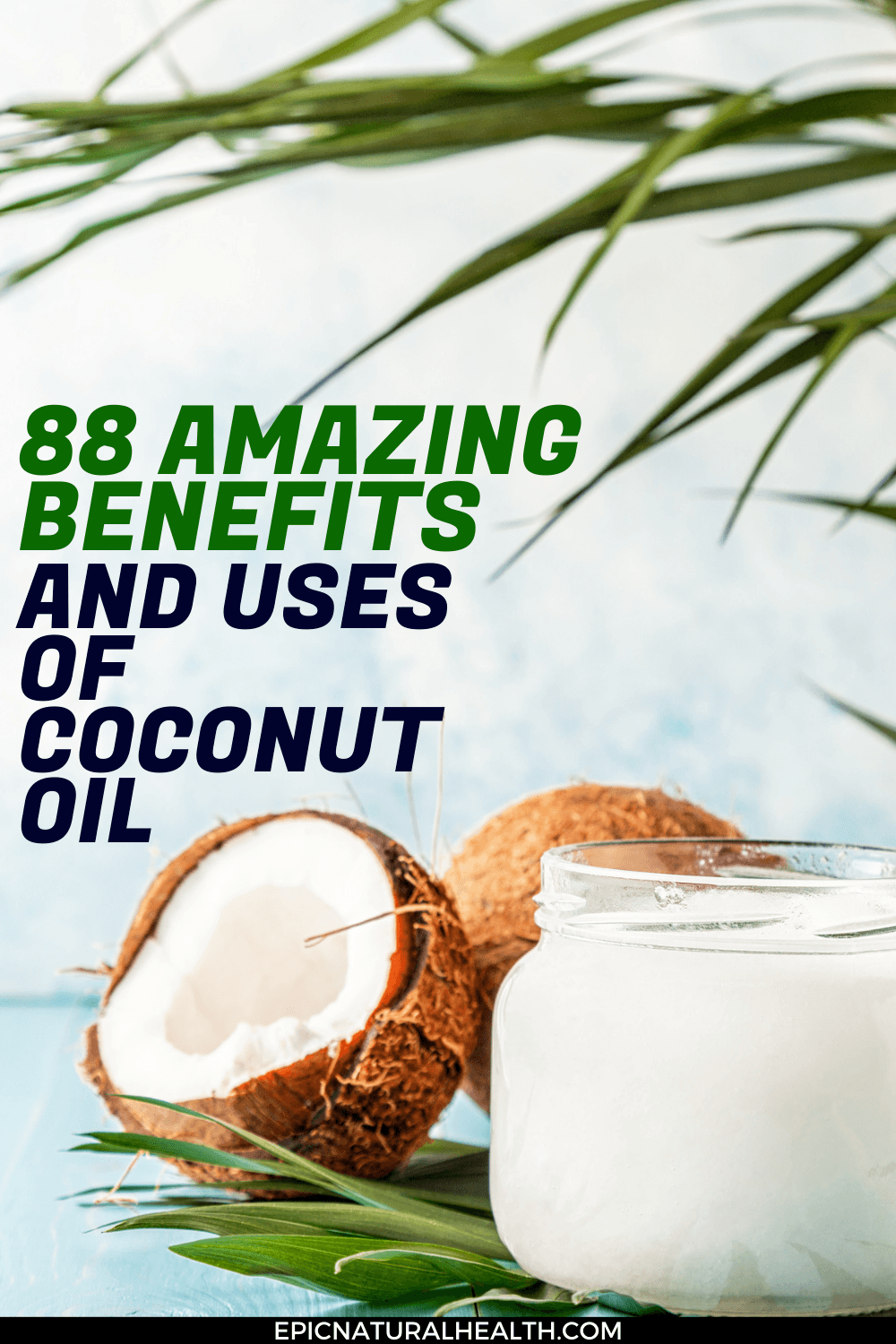
45. As a tanning oil
Coconut oil is one of the best natural tanning oils and one of the easiest ways of getting a beautiful, natural sun-kissed glow. It contains lauric acid and fatty acids that keep your skin hydrated which means your skin gets tanned faster than dry skin.
Keep in mind that coconut oil offers virtually no protection from the sun, so you will need to be extra cautious if using it for tanning.
46. As an under-eye cream

As a powerful natural and gentle anti-inflammatory, coconut oil is an effective method for lightening dark under-eye circles. It also moisturizes while it lightens to help prevent wrinkles and fine lines under the eyes.
It's light enough for the most delicate skin on your face, so don’t worry about bad reactions.
47. In natural homemade diaper cream
One of the common problems babies face in their early days is diaper rash. If you’re getting through commercial creams faster than you can keep up, try coconut oil as a natural alternative.
It can treat diaper rash quickly due to its antibacterial and antifungal properties and is kind to babies’ sensitive skin.
48. As a naturally whitening toothpaste
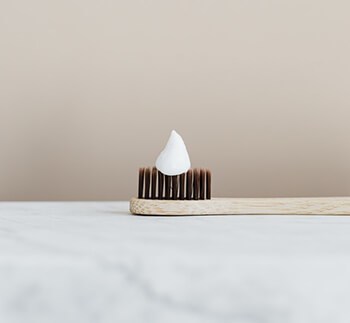
Coconut oil contains lauric acid, which attacks harmful bacteria in the mouth that can cause bad breath, tooth decay, and gum disease. It’s particularly effective at killing an oral bacteria called Streptococcus mutans, which is a leading cause of tooth decay.
Many people make their own natural toothpaste from coconut oil and baking soda – although there is some debate about whether this works quite as effectively as the commercial stuff.
49. As a nail growth booster
Incorporating coconut oil into your nail routine will hydrate and strengthen your nails, amp up nail growth, and even help your manicure last longer. It’s great for treating brittle and cracked nails as well as damaged cuticles because of its moisturizing properties.
Just rub some onto your cuticles every night for a simple nail growth solution.
50. For treating dry elbows
Dry, flaky elbows are an annoyance, and they’ll certainly make you more self-conscious if you're trying to go for a sleeveless look. If left untreated, dry elbows can become uncomfortable and painful.
Rubbing coconut oil onto your elbows will help keep your skin hydrated, and has been found in studies to be just as effective as mineral oil.
Coconut Oil for Hair
51. As a hair rub

One of the easiest ways to use coconut oil for your hair is to simply rub it into your strands on a daily basis. The vitamins and essential fatty acids naturally found in coconut oil nourish the scalp and help to remove sebum build-up from hair follicles.
This helps hair to grow longer, thicker, and faster.
52. Used in homemade shampoo bars
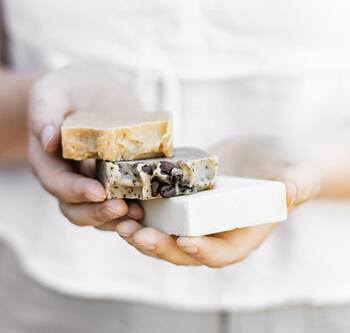
When you make the switch to natural shampoo, you’re safe in the knowledge that you’re using something that washes and nourishes the hair with natural oil. You just need coconut oil, water, lye, and essential oil of your choice to make a simple shampoo bar that will last you for washes and washes.
53. To tackle dandruff
Coconut oil may help to moisturise the hair and scalp and tackle dryness caused by dandruff. The best method of dandruff removal is to use the oil in place of your shampoo and conditioner.
Apply it directly to the scalp and comb through the rest of your hair for extra benefits. Leave it on for a few minutes to make sure the oil has a chance to penetrate your hair and skin, then rinse it off thoroughly.
54. As an anti-frizz treatment
Just a dab of coconut oil can go a long way when it comes to taming frizz. Frizz is the result of uneven absorption of water in the hair's outer layer, and coconut oil creates humidity and moisture barrier and protects the hair fibres from uneven swelling.
For easier absorption and optimal styling, make sure to apply the oil to damp hair.
55. For protecting hair

If you’re planning to go swimming in the ocean or a chlorinated swimming pool, you can protect the fragile ends of your hair from sun and chlorine by coating them with coconut oil before getting it wet. The added bonus to this hack is that your hair will dry smooth instead of tangled, making it easier to manage post-swim.
56. As a natural conditioner
If your hair is dry or damaged, coconut oil serves as a great alternative to deep conditioner products, thanks to its ability to strengthen the hair shaft and prevent breakage. Just rub it into dry hair, put a shower cap on and leave for several hours before washing out with several rounds of shampoo.
Coconut Oil Uses Around the Home
57. In homemade soap for laundry

Coconut oil is a super cleansing addition to homemade laundry soap that produces big, copious bubbles. It can be drying when used alone, but when combined with other ingredients, it’s the ideal oil for soap meant for general cleaning or for laundry.
You’ll need to combine coconut oil with distilled water, sodium hydroxide, and your essential oil of choice for fragrance.
58. Hydrates dry hands
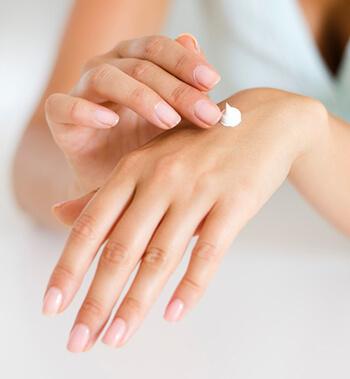
Coconut oil can work wonders on dry, itchy skin. It’s a good idea to keep a jar of organic extra virgin coconut oil by the kitchen sink and put a little on after washing your hands to keep them soft and moist if you have a particularly hard-to-shake dry skin problem.
And if you cook with coconut oil, you can scoop out a little extra for your hands while you’re at it.
59. Cleaning makeup brushes

Cleaning your makeup brushes should be a monthly ritual. If you’re looking for natural alternatives for commercial cleaners, you can use a DIY cleanser that's two parts antibacterial soap and one part coconut oil.
The oil will protect and nourish the bristles while still getting out the grime. Follow up with a quick rinse with baby shampoo and water for the best cleaning effect.
60. As a natural lubricant
Pure 100 percent coconut oil makes a great natural lubricant since it’s super slippery. It’s very rare for people to have any type of allergic reaction to it, either, so it’s safe to use for the majority of us.
Just a word of warning: Don’t use coconut oil if you’re using a condom, as oil can degrade latex and make it less effective in preventing pregnancy and STDs. Only use coconut oil during sex if you feel comfortable without a condom.
61. For treating dog’s paws

If your dog loves hiking and other outdoor activities, his paws can become cracked and raw from all the stress. Rub a little coconut oil on your dog’s paws—it’ll function as both an antiseptic and moisturizer to help him heal.
While topically applying coconut oil should be safe on most dogs, check in with your vet before you give it a try, especially if your pup has a health condition.
62. Get rid of sticky label residue
If you’re dealing with the after stickiness that is left over after peeling away a label, just apply a bit of coconut oil to the sticky area and let it sit for five minutes or so. Wipe it off with a cloth or paper towel and enjoy a sticky-free surface all over.
63. In homemade natural bug repellent
Research has found that coconut oil compounds can repel biting flies and bed bugs for two weeks, while against ticks their repellence was effective for at least one week. Topical application of a high concentration of coconut oil can also repel mosquitoes and prevent potentially fatal mosquito bites.
Use it to make your own homemade natural bug repellent if you’re prone to bug bites.
64. To soften and condition real leather

Coconut oil is one of the oils you can use for conditioning leather. Before you apply the coconut oil, make sure that the leather surface is clean and dry, then rub the oil evenly onto the leather surface and leave it to absorb in a cool and dry place.
65. For polishing wood

Wooden chairs and tables can be polished to like-new status the same way as leather goods. Wipe the wood with a damp cloth, then rub some coconut oil on the wood with a clean cloth in a circular motion.
Let the wood absorb the oil for about 15 minutes, then wipe it away with a clean cloth.
66. Scrub away soap scum

A simple way to keep your shower and bathtub sparkling is to use an all-natural baking soda and coconut oil solution. Mix a couple of tablespoons of coconut oil with baking soda to form a paste, then wipe it across any mildew or soap scum spots.
Leave it to do its magic, then wipe away after 10 to 15 minutes.
67. Make homemade play dough
If the kids are bored, whip up a batch of homemade play dough to start crafting. Just melt 1 tablespoon coconut oil over low heat, then add half a cup of salt, 1 cup of flour, 1 cup of water, 2 teaspoons of cream of tartar, and a little gel food colouring of your choice.
Stir until mixture forms a ball, then remove from the heat and leave to cool before using.
68. Silence squeaky hinges

There’s nothing quite as annoying as a noisy door hinge. Conveniently, if you don’t have any commercial oil lying around, you can easily silence that squeak with a teaspoon or two of coconut oil.
Open and close the door after dabbing oil on the squeaky hinge to work it through your hardware and find peace in your squeak-free home.
69. Make homemade candles

Coconut oil makes a great natural carrier oil for homemade candles, enhancing the scent of whichever essential oil you choose. Just measure a ratio of 3 parts soy wax chips and 1 part coconut oil into a double broiler or glass jar on low heat.
Add your favourite essential oils for a wallet-friendly DIY candle solution. Four cups of melted wax should be enough to yield approximately two small jar candles.
70. As a dust preventer
If you’re fed up with dusting every other day, try rubbing a small amount of coconut oil onto your wooden or plastic surfaces around the house to prevent a build-up. With this method, you can significantly extend the time between cleanings of your harder to reach areas, like ceiling fans and the tops of photo frames.
71. Conditioning cutting boards
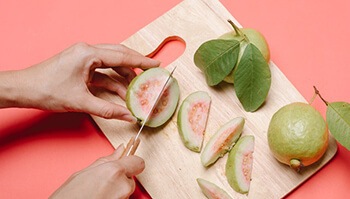
Wooden cutting boards can lose their colour easily and collect bacteria on the surface after each use. Rubbing a little coconut oil over the surface can help revive its brilliance, preventing dullness.
It can also keep the wood moisturized and remove harmful bacteria.
72. In coconut oil dog treats
Coconut oil dog treats aren’t only tasty, but also healthful for your pet. In dogs, coconut oil can prevent and treat infection, reduce bad breath, improve digestion, prevent yeast infection, increase energy, aid in weight loss, and improve ligament conditions.
Combine coconut oil with cinnamon and peanut butter for a treat your dog will love.
Natural Remedies With Coconut Oil
73. Alleviating hay fever

Dabbing a little coconut oil around the edges of the nostrils can help to trap pollen before you breathe it in, preventing you from having a sneezing fit if you suffer from hay fever. The oil also lubricates the nose and heals and soothes cracks in your nostrils, so if you’ve been blowing your nose a lot, it’ll help it to heal faster.
74. Kills yeast infections
Many commercial products for yeast infections don’t treat the core of the issue – but coconut oil does. You can treat a yeast infection by applying coconut oil straight from the jar to the affected area.
Just rub the coconut oil into the skin where the yeast infection is. To treat a yeast infection in your mouth, use 1 or 2 tablespoons of coconut oil and swish the oil in your mouth for 15 to 20 minutes.
75. For psoriasis or eczema
Coconut oil is a safe and effective natural treatment for eczema and psoriasis, two common skin conditions that lead to dryness, itchiness, and rashes. It has antimicrobial properties, which make it effective at killing bacteria on the skin.
It's also highly moisturizing and may reduce inflammation as well as discomfort.
76. Reduces the appearance of varicose veins
Varicose veins are caused by poor blood circulation, particularly in the lower extremities. Coconut oil can be used topically as a circulation-boosting massage oil, and works remarkably well, thanks to its natural benefits that may treat varicose veins. It can also reduce spider veins naturally when used regularly.
77. To speed the healing of sunburn
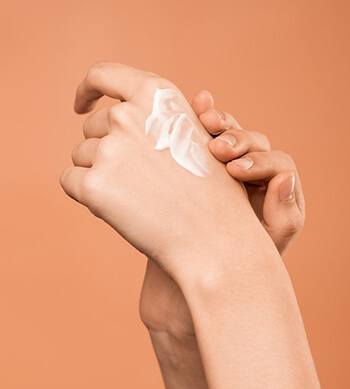
If your skin has ended up slightly worse for wear after too long in the sun, coconut oil might be the natural remedy you’re looking for. It may help moisturize sunburned skin and help minimize itching and peeling – but play it safe and only apply it after your skin has cooled.
It’s also best to only use organic, virgin coconut oil that has been expeller-pressed.
78. To boost recovery from cold, flu, or sore throat

The anti-inflammatory properties of coconut help in soothing the pain, irritation, and harsh feeling of a sore throat. What's more, coconut oil has antimicrobial properties that help in fighting against bacteria, fungi, and several other seasonal viruses.
Add it to a warm cup of tea to enjoy its soothing properties in full.
79. For wound healing
Experts think that coconut oil can help promote wound healing thanks to its high concentration of monolaurin, a fatty acid renowned for its antimicrobial effects. Using high-quality coconut oil can also help reduce the risk of infection in healing wounds.
Just apply a little to the affected area three times a day to encourage your wound to heal faster.
80. Reduces arthritis symptoms
Research suggests that antioxidants called polyphenols found in coconut oil may be able to relieve some symptoms of arthritis. One study in rats with arthritis found that treatment with polyphenols from coconut oil reduced swelling and several inflammatory markers.
81. As an acne treatment

Coconut oil is an all-around superstar treatment for acne. For starters, it’s high in lauric acid, which helps kill the bacteria that cause acne.
Additionally, applying coconut oil to the skin can kill acne-causing bacteria and increase moisture, which may also reduce acne scarring. Use it on a daily basis to keep the acne at bay.
82. In homemade vapor rub
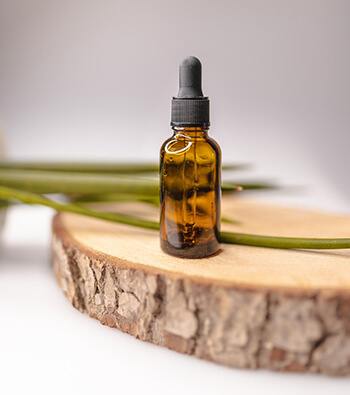
Using coconut oil as a base to a homemade vapor rub will save you money, and you won't expose your family to petroleum or toxic ingredients. Just combine coconut oil with your favourite essential oil and beeswax, then add to a glass jar and refrigerate for regular use.
83. For treating UTIs
Coconut oil has antibacterial, anti-fungal, and antiviral properties that make it an effective treatment for urinary tract infections both internally and externally. Since a UTI is located in the bladder, using this oil topically won't necessarily stop the infection, but it helps with external symptoms, like burning.
Adding more coconut oil to your diet will help to reduce your risk of contracting a UTI in the first place.
84. Clears up cold sores
Cold sores are painful, uncomfortable, and embarrassing. Luckily, coconut oil is one of the best natural treatments for cold sores, thanks to its antiviral, antibiotic, and antifungal properties.
It can be applied topically and taken internally to help treat cold sores. For topical application, start with a small amount of melted coconut oil and apply it directly to the area with a cotton ball or cotton swab, rubbing it into the blisters gently. Your cold sores should naturally heal at a faster rate.
Coconut Oil for Babies and Children
85. For treating ear infections

Medical experts say that some ear infections can be treated at home with essential oils diluted with melted coconut oil. The natural antiseptic properties of coconut oil make it ideal for treating a mild earache, but anything more severe should be treated by a doctor.
86. Beneficial to nursing mums

Mums who are breastfeeding can take a couple of tablespoons of coconut oil a day to increase milk supply and nutrients. Coconut oil has antimicrobial properties that sink into the bloodstream and transfer to the baby via breastmilk.
If you’re a new mum and you ingest and use coconut oil topically, you will make your breastmilk better by strengthening its antimicrobial properties.
87. Gets rid of cradle cap
For babies, coconut oil can be used as a treatment to help with the symptoms of cradle cap, a common rash that causes crusty, oily, or scaly patches on a baby's scalp. Right before putting your baby into the bath, rub some coconut oil onto the scaly patches of his head and the surrounding areas.
Gently massage the oil into the area that has the flaky, scaly skin, then splash with water and leave to soak in.
88. For treating headlice
A recent study compared the effectiveness of coconut oil versus over the counter remedies for treating headlice. The study found that within 4 hours of applying the oil, an average of 80 percent of the headlice in participants’ hair were dead.
In comparison, the over the counter remedies removed just over 90 percent of the headlice. So if you don’t have any commercial stuff to hand, coconut oil will do nearly exactly the same job.
Begin by rinsing hair with apple cider vinegar. Once the vinegar has dried, apply coconut oil to the entire head and let it sit for 12 to 24 hours. Brush through hair with a fine comb, then shampoo.
Conclusion
With an impressive 88 uses benefits and counting, if you don’t have any coconut oil in your cupboards right now, you’re really missing out! If you use coconut oil for anything we haven’t mentioned in this video, feel free to share your own coconut oil hacks in the comments below.

